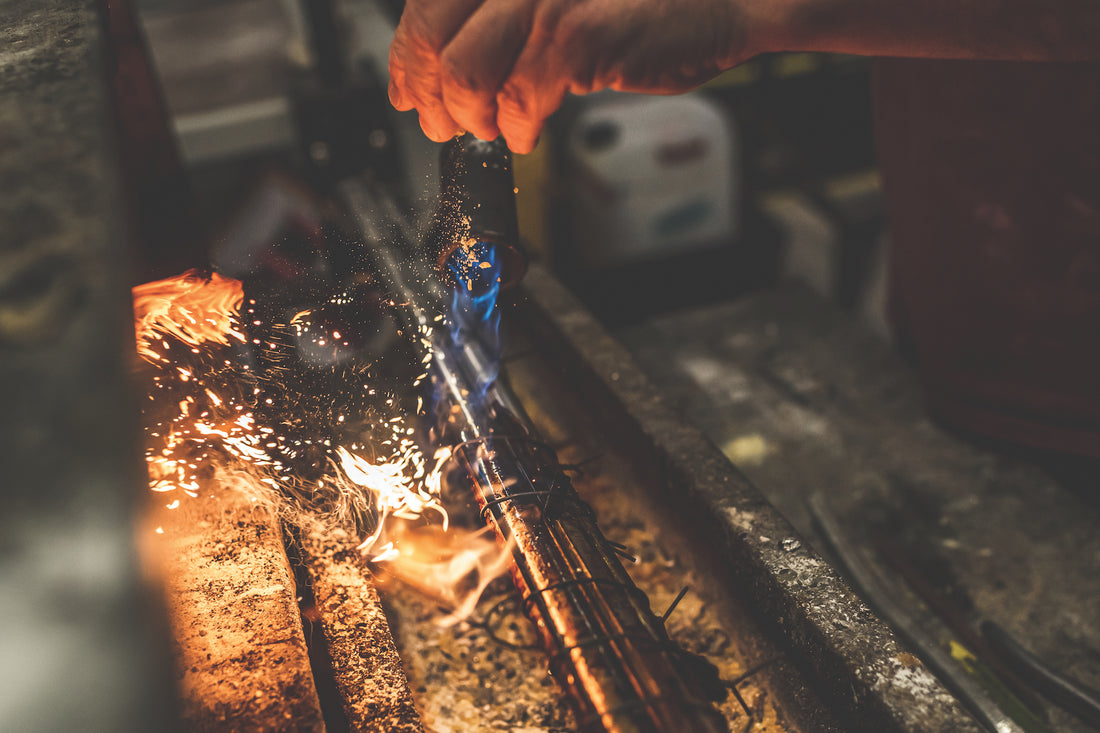At its heart, Purdey is defined by family. James Purdey’s founding of the company in 1814 might have been its genesis, but the passing of the mantle to James Purdey The Younger – who joined in 1843 as an apprentice stockmaker, inherited the marque 15 years later, received a number of Royal Warrants, inaugurated his own sons into the fold, and moved the whole operation to South Audley Street in 1883 –made Purdey the place it is today. Zip forward 120-odd years, and the familial sharing of skills, passing the craft down through the generations, lives on.
On a particularly crisp, bright morning, the shop floor at Purdey’s light-filled Hammersmith factory is as busy as ever. It’s where all stages of the gunmaking process take place, and where we find father and son barrel-makers and regulators Steve and Connor Cranston. They’re relative newcomers to the Purdey family – Connor has been with the firm for 18 months, with a decade of prior barrel-making experience; Steve for two years (though he spent 39 years at Holland & Holland beforehand).
Their relationship at Purdey is symbiotic. Steve, 57, is a far more experienced regulator – that is, someone who rigorously tests the workings of the gun in the factory’s specially provisioned basement. It’s an exacting skill that’s pernickety to teach, especially given the high level of customisation and precision expected of a Purdey gun, the physical challenges exacerbated with age (“Recoil becomes a factor…” says Steve), and the fact that so few people can regulate both shotguns and rifles.

His mentoring of Connor, 26, is reflected in his son’s decade-long expertise in barrel-making. “I started as an apprentice, but then I ended up doing 37 years as a regulator,” explains Steve. “I’ve only really just come back to barrel-making so, technically, I'm his apprentice when it comes to that!”
Crucially, the draw to working alongside family is, says Connor, “the ability to help each other out”; to pass on and retain artisan skills that are an increasing rarity in the trade. “It’s a fantastic journey for us,” explains Steve, “to go through your career working for some of the best gunmakers and to finish off at Purdey is a real honour.” A journey, adds Connor, “that we’ve really only just begun.”
At the other end of the production line stand ‘finishers’ Tom and Russ Nicholls, [age 44 and 40, respectively]. They’re practical journeymen compared to the Cranstons: brought in on traineeships by their father, Bob, who apprenticed at Purdey from the age of 15, staying until he retired in 2012. Russ has been here 18 years; Tom just under 25. (They both had fascinating pre-Purdey callings: Ross as a junior gold Commonwealth Athletics champion; Tom as a member of the RAF.)
Both undertook the same training: learning how to ‘finish’ a gun by building it, setting the mechanics, adjusting the firing points, honing the woodwork, polishing and inking the metal engraving, applying the intricate etching, and preparing the gun for pre-sales testing. The sheer variation, they say, is what they enjoy the most.

It’s a calling they’re keen to pass on to the next generation of gunmaker. They, too, have apprentices – juniors who develop their skills at Purdey over a five-year period, in which they specialise meticulously in one part of the craft before being judged by an exacting panel and receiving their professional ‘papers’ at the culmination.
“There's the romantic side of being a gunmaker. And there's the reality, which is quite different,” explains Tom by way of advice. “The reality is that it's eight hours of bench minimum a day doing a manual job. It's hard work; you need to really like creating and making things.”
What’s the highlight of working with a sibling? “None of it!” they chime in unison, before immediately backtracking. As with the Cranstons, it comes down to a proactively adversarial, fraternal relationship that, crucially, improves the work they do.
“In the Purdey workshop, you need other people to bounce off,” Tom says. “Finishing is the last part of the process – it’s what the customer is going to receive in their shiny golden box. It's not just about how it looks, it's about how it works as well. No matter how long you've been here, there’ll always be something you could use someone else's perspective on. We critique each other’s work in a silly, bantering way.”
“There really aren’t any reservations in working together,” adds Russ, in conclusion. “We're quite a close family, so that helps.” A pause. “But obviously, my guns are better.”
